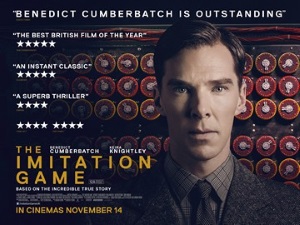
With my interest in computer science in general and artificial intelligence in particular, I was always going to watch any biographical film about Alan Turing. As for my wife, she’d have wanted to add this to our list if only because it stars Benedict Cumberbatch. Since this is a biography of a well-known historical figure, there will be more spoilers than usual since I assume that readers are already familiar with Turing.
The plot proceeds along a couple of parallel tracks. One takes place in 1951 where policemen are investigating Turing’s house following an apparent burglary. The primary one follows him from 1939 as he joins the British effort to break the ciphers created by the German Enigma machine at Bletchley Park. While the others work on manually decrypting the intercepted messages, Turing dreams of creating a machine that would do so systematically. When his efforts are stymied both by the skepticism of his superiors and his fellow cryptologists as well as lack of funding, he writes to Winston Churchill who incredibly makes him the head of the team and provides him with the needed resources.
Of course, no one would have bothered to remember Turing, let alone make a film of his life, if he had not ultimately succeeded. Historians estimate that his work shortened the war by years and saved millions of lives. As screenplay writer Graham Moore and director Morten Tyldum clearly realize, it is the contrast between the magnitude of his contribution and how poorly he has been treated by society that makes his life story so compelling. Due to government mandated secrecy, the full extent of his wartime work would not be known to the public until the 1970s. Yet due to a fluke robbery, Turing was convicted of being homosexual, then still a crime, and forced to undergo chemical castration that many believe later led to his suicide.
Where this film goes wrong is that instead of allowing what is already a very impressive story stand on its own, it invents even more drama. The extensive list of historical inaccuracies on this film’s Wikipedia page for example is very telling. It’s only fair to allow for the usual technical simplifications such as using only a single machine in the film to heighten its sense of importance instead of the hundreds that were eventually built or the silliness of the crib being the epiphany that allowed the machine to finally work when in reality this was the basis from which everyone worked.
What is unforgivable however is drastically misrepresenting Turing’s character and real-life personality to better fit the Hollywood archetype of the eccentric and lonely genius. In reality, Turing was sociable with his friends, highly regarded by his colleagues and known for his sprightly sense of humor when he felt like exercising it. The bombe, as the machine was called instead of the “Christopher” invented for this film, may have been designed by Turing but the construction and operation of the machines involved a huge staff. Turing even traveled to the US to assist the Americans in building their own versions of the machines. The film chooses to portray the post-war Turing as something of a loon who only has his original machine to keep him company. Yet in reality, he was well known and was kept busy designing the first real computers.
Plenty of other clues suggest that we’re dealing with a second-rate director with no particular insight on nor love for the subject matter. The camera lingers for uncomfortably long moments on scenes of battle and the carnage of war, as if the audience needs to be reminded every so often that we’re in the middle of World War Two. An interrogation scene tries to work in a bizarre bastardized version of the Turing Test, even though it has no connection to anything else in the story. The schoolboy romance that serves as a lead into Turing’s homosexuality is uninspiring, rote stuff. It feels rather like a director trying hard to justify a star-studded cast and a large budget. This film makes such a hash of things that I have no idea how it managed to win the Oscar for Best Adapted Screenplay.
In the end, if this is what it takes to introduce Turing to the general public, then I concede that I’d rather have this film than no film at all. But make no mistake, it is the very epitome of mediocrity, a biopic that strives to so closely hew to the established Hollywood archetype of what biopics of scientists should be that it fails to treat Turing as well as the people around him with the proper respect that they deserve.
2 thoughts on “The Imitation Game (2014)”